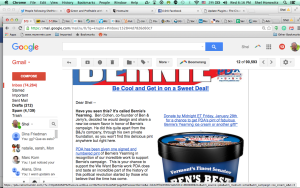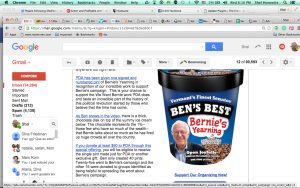What the Ben & Jerry’s vs. Unilever Court Fight Means for Human Rights
When Unilever acquired B&J’s, the agreement guaranteed the ice cream company the right to an independent Board empowered to continue B&J’s decades of social and environmental activism as they see fit. But apparently, Unilever, one of the largest consumer packaged goods (CPG) conglomerates in the world, disagrees with the Board’s repeated attempts to support the people of Palestine, a situation much more dire now after more than a year of constant Israeli attacks that have killed more than 43,000 Palestinians and injured and/or made homeless hundreds of thousands more, including thousands who’ve had their replacement homes or shelters destroyed and had to flee multiple times.
Most of the time, Unilever is one of the better corporate citizens. It’s done a lot of good in the business world for environmental and human rights efforts. Many of its business units, beginning with Ben & Jerry’s in 2012, are certified B Corporations (a business structure that allows environmental and social good to be factored in alongside profitability)–and the parent company has been undertaking a Herculean effort (ongoing since 2015) to get the entire corporation B-corp certified.
But now, Unilever is censoring the B&J’s Board and threatening to dissolve the Board and sue individual Board members. And, once again, B&J’s is suing the parent company over censorship around Gaza.
Israel’s position is unusual because it is treated differently than other governments, in two different ways. Some people grant Israel special status because of its history, and some use that history to condemn it and even question its existence. Here are some of the reasons why Israel-Palestine conflict is treated differently than elsewhere:
The Pro-Israel Reasons Why Israel is Treated Differently
- European and US guilt in the aftermath of World War II, when it became obvious that millions of Jews, Roma, lesbians and gays, people with disabilities, and political opponents of the Nazi dictatorship could have been saved by other nations and were instead murdered in Germany and the lands it occupied.
- Extremely effective pro-Israel lobbying that has demonized Arabs, Muslims, and Palestinians (overlapping groups, but not interchangeable) both within the Jewish community and in the wider culture. I recommend the film “Israelism” as the quickest way to gain understanding of how this has worked. This has been so effectively percolated into the culture that any attack on the Israeli government—even in its current super-brutal iteration—is labeled antisemitism.
- The industrialized world’s continued reliance on fossil fuels from the Arab lands—and the widely-held view within the US government that Israel is our foreign-policy surrogate and enforcement agent in the Middle East (one of the most important strategic regions in the world: a crossroads of trade since ancient times and a place where political, energy, and military control conveys enormous influence over Europe, Africa, and western Asia).
The Reasons Why Others Condemn Israel
- In the larger population, this role as US surrogate gets translated into accepting at face value the common belief that Israel is a bulwark of Western democracy in a region lacking in democracies. And that, in turn, causes conflict with those who criticize Israel’s appalling record of violence and subjugation in the Gaza war. The democracy meme is partially true. If you are a white Jewish citizen of Israel, you have rights under a democracy—but those rights are limited for your Israeli Arab neighbors and do not exist for your Palestinian neighbors in East Jerusalem and just outside Israel’s borders.
- Pretty much every Israeli and Palestinian has experienced direct harm: the loss of loved ones, the destruction of and/or eviction from property, denial of human rights. For 76 years, Israel has oppressed Palestinians, dating back to independence in 1948—and Arab nations have repeatedly waged wars and nongovernmental attacks against Israel. More recently, Israel has initiated several wars. On my second trip to Israel and Palestine ten years ago, I listened to a man who had been only 11 years old when the Israelis told his family not to take a lot of their possessions because they would be back in a few weeks (scroll down in the linked article to the section on Bar-Am). He’s one of many whose story I’ve heard over the years that describe the oppression, loss, and bitterness —as the many Israeli Jews who’ve recounted their own losses through terrorism have also experienced. The gruesome toll affects people on both sides.
- The denial of rights to ethnic and religious minorities within Israel and to majorities in the Palestinian Territories, the violence done to these populations, and the forced resettlement have all combined to make Israel a pariah in the eyes of many.
Unfortunately, what should be anger directed at the government of Israel is often misdirected into attacks on Jews. And it doesn’t help that so many people who should know better equate any criticism of Israel with antisemitism.
Mind you—antisemitism is real and it is not OK. But there’s a big difference between “Israel, stop bombing civilians, stop denying food access, stop destroying hospitals, stop killing journalists,” etc. and saying that the heinous Hamas attack of October 7, 2023 was justified or that the Jews as a people should be destroyed. Those latter constructs are antisemitic. The former are legitimate criticisms of a government gone amok.
But legitimate criticism of violent and discriminatory Israeli policies and actions, even those before October 7, cannot justify what Hamas did. There is NO justification for kidnapping, killing and raping innocents because they happen to be Jewish and living in Israel—just as there is NO justification for killing and torturing innocents because they happen to be Palestinian, Arab, and/or Muslim. And there is also no justification for treating Israel far more harshly in the diplomatic arena than other countries brutalizing occupied populations. If it’s wrong when Israel does it, it’s also wrong when other countries do it. Not to make that clear is another form of antisemitism.
And How Does This Relate to Unilever and Ben & Jerry’s
What Unilever is doing to Ben & Jerry’s is just a less intense version of the censorship and repression on college campuses last spring when Palestinians and their allies demanded justice and peace. What it says is “we espouse values of multiculturalism but we don’t actually believe it. In fact, we believe in demolishing entire populations based on ethnicity, religion, or other factors that we say shouldn’t matter. And we will bring repression down upon the shoulders of those who defend the groups we want to marginalize.”
To make real change, we have to make space for dissenting voices, especially from marginalized populations. That gets stripped away when criticism of Israel’s malignant actions are blocked. If you agree, click to tell Unilever to stop stomping on dissent at Ben & Jerry’s. You’re welcome to copy and modify my message:
As a proud Jew and an activist for 55 years who’s worked on peace, Middle East, the right to dissent, environmental, business as a social change agent, and immigration justice among other issues, I take strong issue with Unilever’s unilateral abrogation of Ben & Jerry’s right to protest genocidal policies in Gaza. With the Board’s independence written into the acquisition agreement, the umbrella entity of Unilever is not obligated to agree with their position and nor does that position have to be thought of as representing the whole corporation—but you are obligated to let them express it. Palestinian rights are compatible with Jewish rights, and the world needs to stop accepting the argument that criticism of Israel’s government is antimsemitism.




